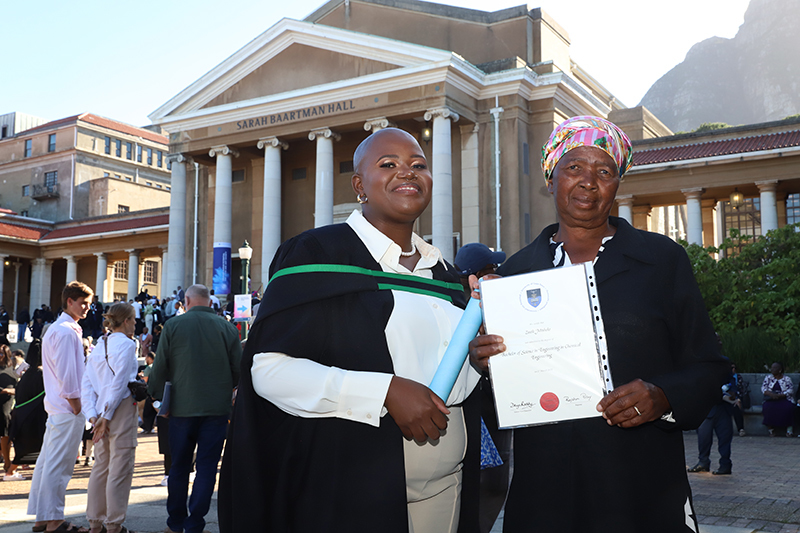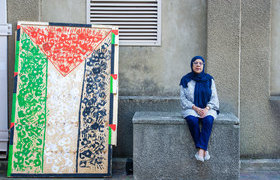‘I am grateful to God and my ancestors for getting me to this point’
05 April 2023 | Story Kamva Somdyala. Photo Michael Hammond. Read time 6 min.
It’s been a rollercoaster ride since enrolling at the University of Cape Town (UCT) in 2016, but Zintle Mtsheke is now clear on how they want to effectively contribute to society as a chemical engineer: by joining a manufacturing company that puts sustainability at its core.
The journey to where they now find themselves had lots of highs and, by Zintle’s own admission, many lows. “I experienced a lot of failure along the way because of personal difficulties and I wanted to give up multiple times. I was indirectly forced by these failures to start doing things outside of my academics,” Zintle said.
Hailing from Mpondombini Senior Secondary School in Mnyaka Location in Bizana, Eastern Cape, Zintle is now looking forward to being able to fulfil their ambitions after graduating on Friday, 31 March.
Said Zintle: “I am grateful to God and my ancestors for getting me to this point. I will forever be indebted to my community, which is my family and friends, for their love and unwavering support. I have received so much kindness along the way, which I am extremely grateful for.”
Kamva Somdyala (KS): What attracted you to UCT and your field of study?
Zintle Mtsheke (ZM): I studied BSc in Chemical Engineering. I decided to come to UCT because I knew it was the best university in Africa, and I imagined Cape Town to be a place where I could freely explore who I was and who I wanted to become.
I specifically chose chemical engineering because I enjoyed mathematics and physical science in high school. I was also someone who enjoyed solving problems and I thought if I enjoyed high school chemistry as much as I did, then I would feel the same about chemical engineering. Little did I know!
KS: Did you find the field of study fulfilling?
ZM: The transition from high school to university was extremely challenging for me, and as a result, the first two or three years of my studies made me feel inadequate much of the time, so I did not find it fulfilling.
However, this changed towards the end of my degree, especially when I was doing my final-year design project – in spite of it being one of the most challenging parts of my course. The overall experience last year was fulfilling for me because I knew that I belonged in the chemical engineering field and that I was more than capable of understanding the concepts and applying them.
“I thought that in the seventh year I was going to finish but failing my final-year design project meant I had to come back in 2022.”
KS: Tell us about how far you’ve come from when you first arrived at UCT.
ZM: The highs were very high, and the lows were extremely low. I knew very little when I got to UCT. When I arrived on campus, it was never a question for me whether I could or could not get my degree within four years because in my mind, it was obvious that I would.
However, four years became five years through joining an extended programme and then five years became six years and six years surprisingly became seven years. With the very last of my attempts to get my degree, I thought that in the seventh year I was going to finish but failing my final-year design project meant that I had to come back in 2022.
While at UCT, I learnt the importance of leaning on others and being able to ask for help. I learnt that I never have to do it alone and that there is always someone who is willing to make a bad situation a little bit better, because on some days, all I needed was a good cry and a hug.
I have come to understand that you always need someone, besides yourself, to believe in you in order to make it through. During my undergrad years, there has always been at least one person who believed I could get my degree – even in the times when I wanted to give up – and this helped me to keep going.
KS: What was the biggest driver in getting you to where you are now?
ZM: I was raised by my grandmother, and she raised me to believe that I was special, so I grew up thinking that I was a star.
When it would get hard along the way, I would remind myself of the beautiful life I wanted for myself and for her.
KS: Please share a bit of information about yourself: What are your goals and ambitions?
ZM: I want to make an impactful change in the engineering industry, by studying and understanding different concepts such as globally responsible engineering and how they can be applied to underdeveloped and developing countries.
I also want to study anthropology and use it as a tool to understand people and society better, because I do not think solutions that exclude the people they are intended to help are always going to be efficient.
I am very passionate about children and think that they are very precious, so I want to create projects or be involved in work that encourages them to dream and believe in their capabilities, so they can grow to be amazing people in whatever paths they choose for themselves.
KS: How do you think the university has changed since you first arrived and what lessons have you learnt from your various leadership positions?
ZM: On the structures that I have come across through my leadership positions, I have seen that the faculty and student support structures are starting to offer more support for students.
As much as there are certain challenges that are not resolved and students who are disadvantaged every single year, I have also seen the importance of student support structures such as UCT_CARES and the Phambili self-development programme.
One of the lessons I have learnt from the different leadership positions I have held is the importance of the university management continuously engaging students on decisions that affect them, so there is collaboration on solutions that will also benefit the students.
I have also learnt that sometimes structures do exist, but they do not work, hence it is important that structures are reviewed as often as possible, to understand what works, what does not and how things can be changed.
KS: What career do you intend on pursuing now that you have graduated, and why?
ZM: I intend on joining the manufacturing industry, but specifically looking at companies that have sustainability at the core of their business.
As much as the world is changing, at the centre of it all, humans are always going to consume stuff, which means commodities will always need to be made.
Even though the engineering industry has brought about so many great inventions and solutions, its impact on the environment and human life has also been detrimental in some instances, which is why I am passionate about being involved in work and projects that prioritise sustainability and also come up with ways to restore the planet.
 This work is licensed under a Creative Commons Attribution-NoDerivatives 4.0 International License.
This work is licensed under a Creative Commons Attribution-NoDerivatives 4.0 International License.
Please view the republishing articles page for more information.










